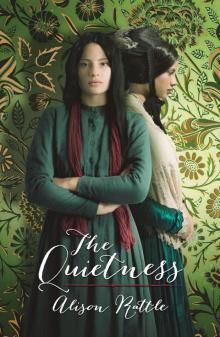- Home
- Alison Rattle
The Quietness Page 2
The Quietness Read online
Page 2
Da wouldn’t look up from the floor, like it was his fault the baby had died. Queenie watched as he stood and gathered the baby up with quick angry movements and parcelled it in the blanket. Without his neckerchief tied at his throat, Da looked unfinished. The green silk with its yellow flowers belonged around Da’s neck and not in his hands. It told the world who he was: a seller of fruit and vegetables. A costermonger. He was so proud of his green silk; it was a bad thing that he’d taken it off. He’d be taking it to the pawnshop, Queenie knew. Hoping for a few shillings to bury the baby. He didn’t try to comfort Mam or even kiss her before he slammed out the door.
After he’d gone, the room seemed smaller. Mam had finally shut up and was lying down on her bed with her face to the wall. The little ones were tugging at Queenie and wailing for their breakfast. She shook them off and they straight away hunched together again: a pile of wide eyes and jutting bones. Queenie could hardly tell who was who any more. Which was Tally? Which was Kit? Which was Albie? They were all of them shrunk to skin and bone with tatty hair and smudged-out faces. Queenie couldn’t bear to look at them or to watch Mam lying there with her arms all empty. Besides, hunger was growling around her insides like a mad dog on the loose.
There’d be nothing to sell today, Queenie knew that. No spare shillings to buy pears from the market to fill her basket, not with a burial to pay for now. But she couldn’t stand to stay in the sadness of that room, not when there were other ways of cadging a penny or two; plenty of other ways.
Outside, great slabs of fog, the colour of dirty linen, hung in the passageways as she trailed her fingers along the walls of houses to find her way out on to the streets. The fog was always bad here, being so close to the river, and the lingering smells it brought with it were enough to make a cat retch. But Queenie never minded it. She liked to disappear in it; it made her feel free somehow, and made for easy pickings if you were of a mind to relieve a careless gentleman of his purse.
She would walk to Waterloo Bridge, she decided; there were always plenty of people about there. By midday the fog turned a murky yellow, and she liked to stand on the bridge and watch how the tall chimneys of factories and the bulky warehouses on the banks of the river got blurred in the greasy veil and were turned into mysterious golden palaces.
There would only be six of them now, she thought, living in their pokey little room. One less mouth to feed. And she felt lighter somehow, and unbuttoned and easy, and she even noticed a faint tongue of sunlight licking its way through the fog. Just the sight of it warmed her insides.
4
Ellen
Mother had just taken a tiny bite of her muffin when Father loudly cleared his throat. The crumb, which had been balancing delicately between Mother’s front teeth, shot out across the table and lay quivering in the centre of the white lace tablecloth. Mother clamped her napkin to her mouth in horror and we both looked across at Father.
He had not touched his breakfast and was already folding his newspaper. Mary had set a candle on the table next to him. The flicker of the flame and the grey morning light had given his face the waxy complexion of a corpse. Flesh hung from under his eyes and mutton-chop whiskers grew wide and long on the broad sides of his head. His hands were slender, though, despite his fatness; his fingers long and tapering and delicate like a woman’s. They made me shudder.
Father cleared his throat again. He used words sparingly. Mealtimes were for nourishing the body and not for idle chatter. His deliveries of the morning prayers were the only words ever permitted to break the silence of the dining room.
‘I received a letter this morning,’ he stated, and he took a fold of paper from his pocket and slowly spread it out.
He had never addressed us at the meal table before and I had to hold my hands in my lap to stop them from trembling.
‘It seems,’ said Father, ‘that my dear sister Isabella is no longer with us.’ He scanned the letter again. ‘Ah, yes. Thrown from her carriage and trampled upon by horses.’
There was a gasp from Mother and she clutched at her throat. Mary hurried to her side and poured her a glass of water.
‘Yes,’ continued Father. ‘It would seem she met her end in a most ghastly fashion.’
My mind was racing. Who was Isabella? I had no idea that Father had a sister. Questions bubbled into my mouth, one on top of the other. Questions I knew I could not ask now.
‘However,’ said Father, ‘I will spare you further details. All you need know is that her sixteen-year-old son, Jacob Grey, will be coming to stay with us for a time.’
A cousin, I thought. I have a cousin?
There was a thud and a clatter of cutlery. I turned to find Mother had fainted. I sighed. She would be indisposed for days now, and I would have to attend to her birds as she sipped her tonics and twittered out instructions from the depths of her bed.
‘So,’ said Father. He folded the letter carefully, ignoring Mother’s predicament. ‘It seems we must extend our hospitality to this . . . boy. It would not do to be seen as uncharitable. Mary, you will get the blue room ready for our guest. And, from tomorrow, this household will be in mourning. Now, fetch my hat and coat and clean up this . . . mess.’ He waved his arm over the table at the leftover remains of breakfast and at Mother, spilt across the table like a jug of milk.
The front door slammed and Mary tsk-tsked as she helped Mother from her chair. I did not offer to assist. I was thinking of Isabella Grey, of an aunt I had not known existed, and of Jacob Grey. My cousin, Jacob Grey. I liked the name. Jacob Grey, Jacob Grey, I whispered. It tasted good, like a bowl of spiced soup on a cold wet day, or the crisp skin of pork, salty and hot from the fire. Would he be handsome? I wondered. Would he be kind? What would he think of me? He would be grieving, I reminded myself. I hoped I could offer him some comfort.
5
Queenie
It had been three days since the baby died and Da was still not home. Queenie sat on the musty straw in the corner of the room shivering. The little ones were sleeping next to her, and Mam still hadn’t moved off her bed. Mam had done nothing but sleep or stare at the walls. She’d stopped sobbing at least and the little ones had stopped mithering, but the quietness was the wrong sort.
Da would be drinking, Queenie knew, but he’d never stayed away for this long before. Sometimes when he didn’t come home all night Mam would send her out in the morning chill to search the streets and gin-shops. She’d peer down dim alleyways and into doorways, hoping like mad that one of the lumps sleeping under their jackets would be Da; his pockets empty and his breath stinking of stale beer. She’d pray to catch a glimpse of the green and yellow of his neckerchief, bright against the stubble on his face. Often as not she’d find him curled under a table, snoring gently into the early morning silence of a gin-shop; an empty mug still held in his hand and a pack of cards scattered across the table. After she’d shaken him awake, they would hold tight to each other as she steered him through the streets back home.
But it had been three whole days, and she’d run out of places to look. There was only the workhouse now, or Horsemonger Lane Gaol, and she hoped he wasn’t in either of those places. People never came out of those dark holes.
Queenie hadn’t fared too well out on the streets the last few days. She’d managed to snatch a hot pie from a street vendor, and to hide herself quickly while his angry hollers got swallowed up in the fog. But then a quick-witted gentleman had smashed her leg with his walking stick when he felt her hand creep into his coat pocket. Now Queenie was bruised and sore and knew she wouldn’t be able to outrun a swift stranger.
Queenie got up from the pile of straw and limped over to the bed. ‘Mam,’ she said, ‘Mam! Get up now. Come on. The little ’uns are starving. We need you. Come on!’
It was Mam, but not Mam, who eventually turned to look at her. It was Mam’s face, but there was something wrong with her eyes. They were flat and dead like the glassy eyes of the bloaters down at Billingsgate.
‘
I’ve looked all over for Da,’ said Queenie. ‘I can’t find him nowhere. Maybe he ain’t coming back this time.’ She shook Mam’s shoulder hard. ‘Come on! You need to get up now!’
Mam sighed deeply and slowly rose from the bed. She stood up and began to tidy herself. Queenie watched her scrape her fingers through her hair and wash her face with spit on a rag. Her hair was black and velvety. Da always said it was like a dark summer’s night. When she unpinned it a shower of dust flew out, and curls rolled down her back stopping just short of her waist. Da was mad for her hair. He would take a thick length and bury his face in the depths of it and cry out, ‘Thank you, Lord, for my own sweet Dollymop!’
Mam would push him away and tell him to keep his filthy hands to himself, but her eyes would be laughing as she tied her hair back into place. But Da wasn’t here now and Mam wasn’t laughing.
‘Mam,’ Queenie said. ‘How’re we going to eat? There’s no money to go to market. Why’s Da buggered off again? Don’t he care a bit?’
‘Your Da’s a proud man,’ said Mam quietly, like she was talking to herself. ‘With the baby gone and that . . . he thinks he’s failed us. But I’m not proud, and I won’t see another of my children starve.’
She hung a sheet across the middle of the room and told Queenie to keep the little ones quiet. It wasn’t hard. They barely murmured when she pulled them close and whispered them stories of talking rats and hidden treasures. Tally, the eldest, was learning his letters and Queenie helped him to shape them using a stick to scrape in the dirt floor. Soon the little ones grew tired and drifted off to sleep curled up tight to each other.
Mam was in and out all that day, bringing strange men with her, one at a time, into the room. Queenie never saw them, only heard them as they wheezed through the door and dropped their trousers on the floor. They didn’t speak much, just grunted and sniffed or coughed and spat. Some of them banged the bed against the wall for an age, but others only took a minute to let out a groan of satisfaction, like they’d dined on a plate of good roast beef and couldn’t eat another morsel. Mam didn’t sigh like she did when she was with Da. She hardly made a sound; only cried out a couple of times like she was hurting.
Queenie knew what she was doing and thought of the bloated faces in the gin-shop and grubby fingers fumbling beneath her own skirts. She was glad it was Mam this time.
Mam was quiet a long time after the last of the men had paid up and left. Queenie fell asleep and dreamt of fat pigs gobbling up troughs of plums and Da spinning Mam around the room, faster and faster, her hair flying across her face and Da laughing and laughing.
‘Queenie, Queenie . . . come on, now. Quick. Take this.’ Mam was shaking her awake and pressing coins into her hand. ‘Go on now and fetch some coal. And some bread and dripping. Oh, and best get a pennyworth of tea while you’re at it.’ She’d taken the sheet down and pinned her hair back up. Queenie grabbed the coins and hurried towards the door. She glimpsed a man’s felt cap lying on the floor beside the roughed-up bed and wondered for a moment how Da would feel about his space being borrowed by dirty strangers. He could think what he bleedin’ well liked, she decided. He’d be here if he cared that much.
They had the finest meal in all of London that night. Mam made the tea strong and hot and she covered doorsteps of bread in a thick layer of white dripping that tasted like heaven. They ate until their lips and cheeks were shiny with grease. The coals in the stove turned ashen and Mam began to sing softly to herself as she stroked her mound of belly.
Cry baby bunting
Daddy’s gone a-hunting
Gone to fetch a rabbit skin
To wrap the baby bunting in.
6
Ellen
Mary had finished putting Mother back to bed and was airing the blue guest room and removing dust sheets. I walked past her and along the corridor to Mother’s room. It was dark inside. The curtains were drawn and the air was musty with the sour odour of bird droppings. My eyes adjusted to the light and I saw the small hump of Mother lying in the centre of her bed, the covers drawn up to her chin.
‘Is that you, Mary?’ she whispered. ‘Fetch me my shawl.’
‘No, Mother, it is me,’ I said. ‘It is Ellen.’
‘What do you want, girl?’ she hissed. ‘Go and get Mary for me.’
‘I just want to talk to you for a moment,’ I said. ‘Where is your shawl? I will fetch it for you.’
‘Talk?’ she said. ‘Talk? Can you not see I am indisposed? Get Mary now.’
‘But Mother, it will only take a moment. I want to ask you about Aunt Isabella, and . . . and Jacob Grey.’
‘How dare you!’ she spluttered. ‘This has nothing to do with you. Now leave me in peace.’
‘But I have an aunt I know nothing about! And a cousin! Why have they never been spoken of before?’
Mother coughed; dry little barks, and she waved me away with her hand.
‘Get me Mary,’ she croaked.
‘But Mother,’ I persisted, ‘I have a right to know about my family!’
‘You,’ she whispered, seemingly exhausted from her coughing, ‘have no right to know anything. Now fetch Mary!’
She closed her eyes and I knew it was of no use to ask again. What was wrong with me that she could not love me? I swallowed hard to hold back my tears and left the room, daring to close the door hard behind me. Mother’s birds started squawking and flapping and I thought that even though they were caged, at least they were loved.
I hurried back to the guest room where Mary was smoothing the counterpane on the newly made-up bed.
‘Mother is asking for you,’ I told her. She turned to go and I put my hand on her arm to stop her. ‘Mary. What can you tell me of my Aunt Isabella and my cousin?’ I felt her stiffen under my touch.
‘I . . . I . . . I don’t truly know, miss,’ she said. ‘I think it best that you don’t ask me.’
‘Do not be silly, Mary, what is there to hide? I will find out soon enough. Jacob Grey will be here in a few days.’
‘I know, miss, but it’s something that’s never spoken of. It is a family matter and I don’t wish to lose my position by talking out of turn.’
‘That would never happen,’ I said. ‘Please, just tell me what you know.’
‘Miss,’ she sighed, ‘all I know is there were words between your father and his sister. Harsh words, and many years ago. Her name has never been spoken since. Now let me get on and don’t you breathe a word.’
I nodded and let go of her arm. She walked briskly out of the room. I watched her go and wondered what I would ever do without her. When all the governesses came and went over the years, the cold, distant women who taught me my letters and how to keep quiet, Mary was my only comfort. She laughed at my attempts to speak French, smuggled pieces of cake to my room and listened to me as I read her passages from my favourite books.
‘You’ll be the most beautiful bride in London one of these days, miss,’ she told me as she brushed my hair at bedtimes.
‘Will my husband be handsome?’ I asked her. ‘And will he be rich?’
‘But of course, miss, he’ll be the most handsome, richest man ever.’
‘And will we have children?’
‘Hoards of ’em,’ she said with a wink.
‘Then you will have to come and live with us, won’t you? To look after us all.’
‘That I will, miss, that I will,’ she would say.
I looked around the guest room: at the new cake of soap on the wash stand and the plumped-up pillows on the bed. I hoped the days would pass quickly and that Jacob Grey would arrive safely.
7
Queenie
For as long as Queenie could remember, Mam had told stories. If she couldn’t feed Queenie’s belly with tasty morsels, she would fill her head instead. Mam’s words took Queenie to warm places where there was always a fire burning and a table laden with food. She told of the taste of hot winter broths and steaming apple pies. Her words filled Queenie’s em
pty spaces and took away the sharp gnaw of hunger. As the little ones came along, first Tally, then Kit, then Albie, Mam made room for them all in the rough folds of her skirts as they sat by her feet and listened hard. Da was never there. He was always out on the beer. ‘He’ll be home soon,’ Mam would say hopefully. ‘With a rabbit for the pot maybe, and a blanket for the next baby.’
Queenie loved Mam telling of the time before she met Da. In the days when she was young and pretty and worked in a house on the other side of the river. In a house that was as white as the bone on a newly boiled ham, she said. The house was full of rooms. So many rooms, there were doors that were never opened. It smelt of warm honey; of polished rosewood and hair oil; cigar smoke and lavender. Queenie could only imagine those smells, but they sounded good enough to eat. Every space was filled with dark furniture that was covered by lace. There was even paper on the walls with patterns of birds, flowers and ivy coloured in reds and greens and golds.
Then Mam would tell of the room full of books. Floor to ceiling full of books. The grandest books you ever saw; smart in leather bindings and all tucked neatly into their own little space on a shelf. Mam dusted those books, one by one. Ever so careful. Queenie imagined what an age it must have taken. Hundreds of them, there was. Sometimes, Mam whispered, she would dare to pick up the books and open the covers to smell the ink. She liked to feel the paper between her fingers. Some pages felt rough and heavy but others felt as light as onion skins. Best of all were the pictures hidden between the pages: flowers in all their detail, dark-skinned men in strange costumes, beautiful ladies dressed like ships in full sail and the most curious of creatures. Great birds the colour of jewels with beaks as long as swords, and monsters with claws and horns as thick as your legs. It was in that room that Mam learned her letters. With all those books, she said, she couldn’t help herself.

 The Beloved
The Beloved The Madness
The Madness The Quietness
The Quietness V for Violet
V for Violet